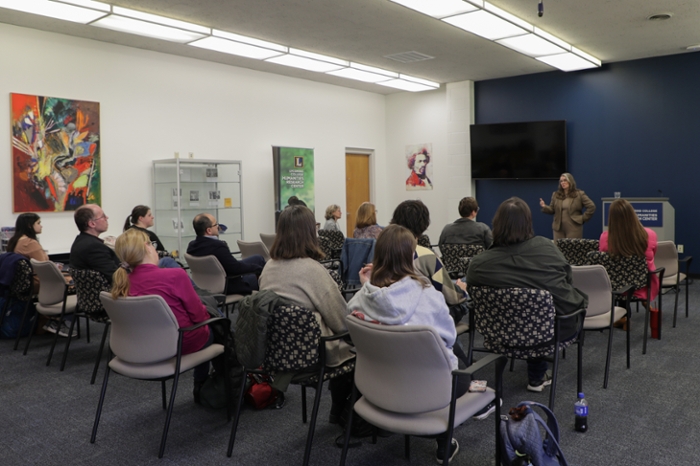
Download Image: Web
For many creatives, the last step of their work — getting it published — remains elusive and confusing. This is where literary agents, like Kate McKean, come in.
Lycoming College recently hosted McKean, a NYC-based writer and a literary agent at Howard Morhaim Literary Agency, for a talk based on her forthcoming book “Write Through It: An Insider’s Guide to Publishing and the Creative Life,” set to launch in June.
Addressing Lycoming students, faculty, and staff, McKean shared the benefits of working with an agent, including their role as a mediator between writers and publishers and relaying important financial information regarding novel publishing. For new writers, the process of looking for an agent can be daunting, and McKean offered this advice: “What’s the heart of your book? That’s what you have to tell your agent.”
“What’s the heart of your book? That’s what you have to tell your agent.”
She also discussed developments in the literary market, including the rise of romantasy and young adult (YA) fiction, as well as the challenges of publishing middle-grade novels for an audience often between 8-12 years old, and picture books, including children’s books and graphic novels.
During her visit to Lycoming, McKean shared her experiences not only as an agent but as a writer, including her search for a publisher and what helped her in her writing. “Reading a good book is what refuels me,” McKean said. “Talking about a good book also does it.” McKean went on to stress that writers “do not need to have a 27-year publishing plan” and instead urged those hoping to get published to read a lot of books to gain a better understanding of the market.
With the Howard Morhaim Literary Agency since 2006, McKean has built a diverse client list including New York Times best-selling authors Madeleine Roux and Alix E. Harrow. The works she publishes fall under multiple genres, such as YA horror and fantasy, and includes New York Times best-selling internet sensations like “I Can Has Cheezburger.” Her newsletter, Agents and Books, covers her work and more advice for novice writers seeking publication.
McKean’s talk was co-sponsored by the Humanities Research Center and the English department. The Humanities Research Center enhances educational opportunities for students majoring or minoring in any of the humanities by supporting collaborative student-faculty research, internships, guided scholarship, study abroad opportunities, education certification, digital humanities, graduate school placement, and fellowships.